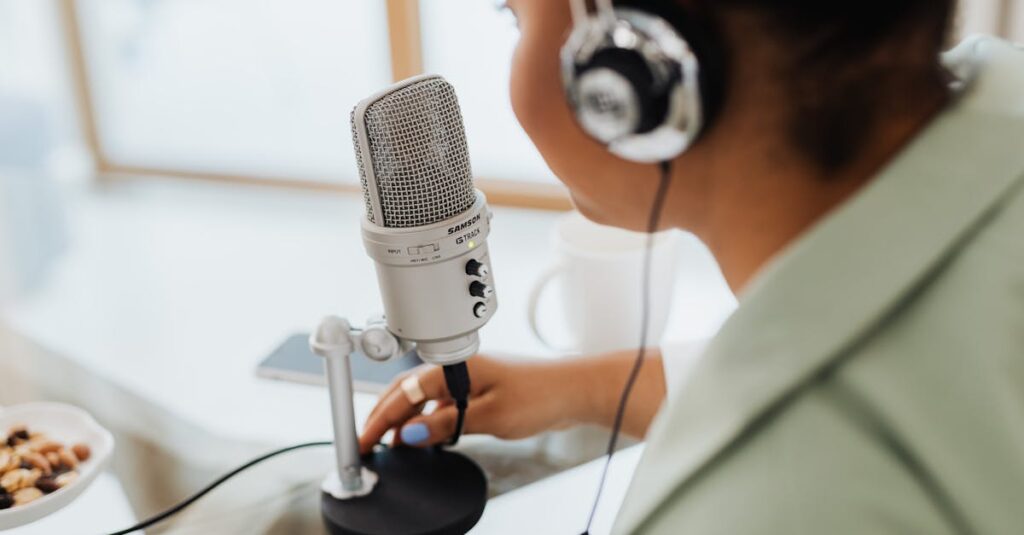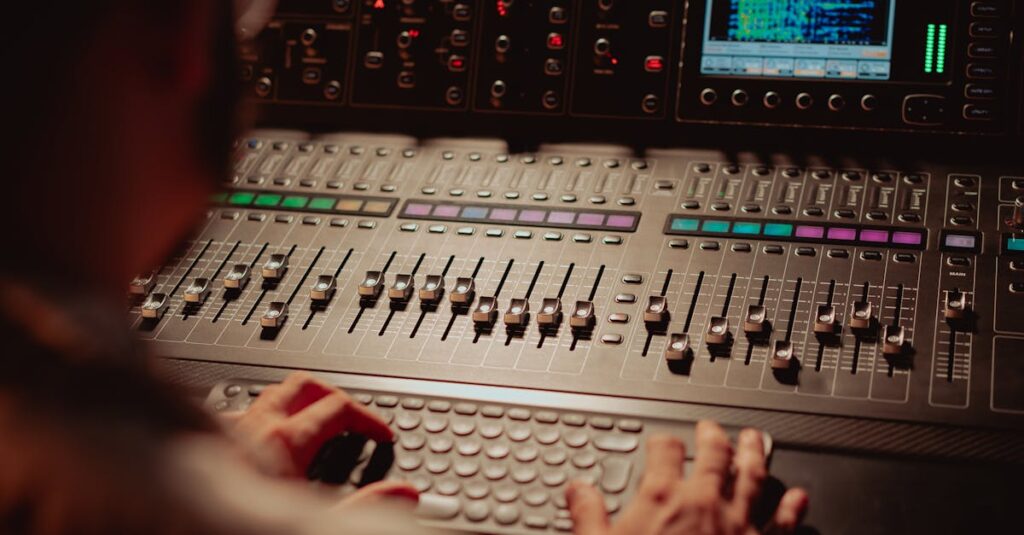Pursuing a music production degree online has become an increasingly popular choice for aspiring producers and music industry professionals. The digital age has transformed how students learn audio engineering, sound design, and music business fundamentals – all from the comfort of their home studio.
Online music production programs offer flexible schedules and industry-standard training that rivals traditional on-campus education. Students gain hands-on experience with professional digital audio workstations (DAWs), mixing techniques, and music theory while building their portfolio. They’ll also network with experienced instructors and peers who share their passion for creating music. With the music industry’s continued shift toward digital production and remote collaboration, an online degree provides relevant skills for today’s evolving landscape.
Music Production Degree Online
An online music production degree combines audio engineering principles with digital production techniques through virtual learning platforms. Students gain expertise in recording technologies, mixing strategies, sound design fundamentals, and music industry practices from remote locations.
Core Components
- Digital audio workstation (DAW) proficiency training
- Music theory and composition fundamentals
- Sound recording and mixing techniques
- Audio signal processing and effects
- Music business and copyright law basics
Program Structure
The degree program spans 120-130 credit hours across 8 semesters for a bachelor’s level education. Course delivery includes:
| Component | Delivery Method |
|---|---|
| Video lectures | Asynchronous streaming |
| Virtual labs | Real-time software training |
| Project assignments | Cloud-based submissions |
| Industry workshops | Live online sessions |
| Portfolio development | Guided mentorship |
Technical Requirements
- Professional-grade DAW software (Pro Tools, Logic Pro X, Ableton Live)
- Audio interface with mic preamps
- Studio-quality headphones or monitors
- High-speed internet connection (25+ Mbps)
- Computer meeting software specifications
Learning Environment
Online music production programs create interactive spaces through:
- Virtual collaboration rooms
- Digital project sharing platforms
- Online mixing and mastering workshops
- Remote recording sessions
- Industry guest speaker webinars
Students access course materials 24/7 through learning management systems while engaging in practical assignments that mirror professional studio workflows. The curriculum emphasizes hands-on experience with industry-standard tools alongside theoretical knowledge development.
Benefits of Studying Music Production Degree Online
Online music production education delivers comprehensive training through digital platforms while offering distinct advantages over traditional classroom settings.
Flexible Learning Schedule
Students access course materials 24/7 through virtual learning environments, creating a personalized study schedule that fits around work commitments. The asynchronous format enables learners to:
- Review complex mixing techniques multiple times
- Complete assignments during peak productivity hours
- Balance studio internships with coursework
- Participate in global collaborations across time zones
- Pause lessons to practice specific production skills
Professional-Grade Software Access
Online programs provide students with industry-standard Digital Audio Workstation (DAW) licenses and production tools through educational partnerships. These resources include:
- Ableton Live Suite for electronic music production
- Pro Tools Ultimate for professional audio editing
- Logic Pro X for Mac-based music creation
- Native Instruments Komplete for virtual instruments
- Waves Plugin bundles for mixing and mastering
| Software Package | Regular Price | Student Access |
|---|---|---|
| Pro Tools Ultimate | $2,599/year | Included |
| Ableton Live Suite | $749 | Included |
| Logic Pro X | $199 | Included |
| Waves Gold Bundle | $799 | Included |
Top Music Production Degree Online
Leading universities offer accredited online music production programs at both undergraduate and graduate levels, providing comprehensive education in audio engineering, music technology, and sound design. These programs combine industry-standard software training with professional music business practices.
Bachelor’s Degree Options
Online Bachelor’s degrees in music production integrate fundamental audio concepts with advanced digital production techniques across 120-credit programs. Popular options include:
- Berklee College of Music’s Bachelor of Music in Music Production & Engineering
- Full Sail University’s BS in Music Production
- Academy of Art University’s BFA in Music Production & Sound Design
- Liberty University’s BS in Commercial Music with Music Production specialization
Each program features:
- Professional DAW certification courses
- Virtual studio production labs
- Music business & copyright law modules
- Sound design & mixing workshops
- Industry mentorship opportunities
Master’s Degree Programs
Graduate-level online music production programs focus on advanced production techniques, research methodologies & specialized areas of audio technology. Top programs include:
- Johns Hopkins University’s MA in Audio Sciences
- Berklee’s Master of Music in Music Production
- Full Sail University’s MS in Music Production
- Advanced mixing & mastering techniques
- Audio research methodologies
- Spatial audio & immersive sound design
- Music supervision & licensing
- Thesis project development
| Program Level | Average Duration | Credit Hours | Software Included |
|---|---|---|---|
| Bachelor’s | 4 years | 120-130 | 5-7 DAWs |
| Master’s | 2 years | 36-48 | 3-5 DAWs |
Essential Courses and Skills Covered
Online music production degree programs deliver comprehensive training in industry-standard tools, technical concepts, and creative applications. The curriculum integrates practical skills with theoretical knowledge through specialized courses focused on modern music production techniques.
Digital Audio Workstations (DAW)
DAW proficiency forms the core foundation of online music production programs. Students master these essential DAW skills:
- Recording live audio tracks with proper gain staging techniques
- Editing MIDI sequences for virtual instruments
- Mixing multiple tracks with EQ, compression, and effects
- Creating automation curves for volume, pan, and plugin parameters
- Exporting finished projects in various formats (WAV, MP3, AIFF)
Popular DAW platforms covered include:
| Software | Key Features | Industry Usage |
|---|---|---|
| Pro Tools | Recording, editing | 80% of professional studios |
| Logic Pro X | MIDI, virtual instruments | 65% of composers |
| Ableton Live | Electronic music production | 70% of EDM producers |
| FL Studio | Beat-making, sequencing | 55% of hip-hop producers |
Sound Engineering Fundamentals
Sound engineering courses cover critical technical concepts through virtual labs and interactive modules:
- Acoustic principles including frequency response and room treatment
- Signal flow in analog and digital audio systems
- Microphone types, placement techniques, and polar patterns
- Audio compression formats and bit depth considerations
- Dynamic processing using compressors, limiters, and gates
- Advanced stereo imaging and spatial audio concepts
| Project Type | Skills Developed | Duration |
|---|---|---|
| Multi-track Recording | Gain structure, routing | 4-6 weeks |
| Mix Engineering | EQ, compression, effects | 8-10 weeks |
| Mastering | Loudness, stereo enhancement | 6-8 weeks |
Career Opportunities After Graduation
Music production degree graduates enter diverse career paths in the audio industry, leveraging their technical expertise and creative skills. These opportunities span traditional studio environments, independent production work, and emerging digital platforms.
Studio Production Roles
Professional recording studios hire music production graduates for specialized positions:
- Audio Engineers manage recording sessions, operate mixing consoles, and maintain studio equipment
- Assistant Engineers handle technical setup, cable management, and session documentation
- Mix Engineers blend multiple audio tracks into cohesive final productions
- Mastering Engineers optimize finished tracks for various distribution formats
- Pro Tools Operators specialize in digital audio workstation operations during sessions
- Sound Designers create audio effects for films, games, and multimedia projects
| Studio Role | Average Annual Salary (USD) | Experience Required |
|---|---|---|
| Audio Engineer | $52,000 | 1-3 years |
| Mix Engineer | $68,000 | 3-5 years |
| Mastering Engineer | $72,000 | 5+ years |
| Sound Designer | $65,000 | 2-4 years |
- Music Producers create tracks for artists across multiple genres
- Remote Mixing Engineers process audio projects through digital platforms
- Beat Makers compose instrumental tracks for sale or licensing
- Project Studio Operators run small-scale recording facilities
- Composition Producers create music for media content creators
- Mobile Recording Engineers capture live performances on location
| Freelance Service | Average Rate (USD) | Project Duration |
|---|---|---|
| Track Production | $500-2,000 | 1-2 weeks |
| Mixing Services | $300-800 | 3-5 days |
| Beat Creation | $100-500 | 1-3 days |
| Live Recording | $400-1,000 | Per event |
Cost and Financial Considerations
Online music production degree programs range from $15,000 to $65,000 in total tuition costs, varying by institution type private universities typically charging more than public ones. Programs from Berklee College of Music cost approximately $59,880 per year, while Full Sail University’s program totals $58,500 for the complete degree.
Tuition Breakdown
| Cost Component | Average Range |
|---|---|
| Per Credit Hour (Public) | $300-$500 |
| Per Credit Hour (Private) | $700-$1,200 |
| Technology Fees | $500-$1,500/semester |
| Software Licenses | $200-$800/year |
| Equipment Costs | $1,000-$3,000 |
Financial Aid Options
- Federal student loans with fixed interest rates between 3.73% to 6.28%
- Merit-based scholarships from music industry organizations like NAMM Foundation
- School-specific grants for audio production students
- Work-study programs through virtual teaching assistant positions
- Private education loans from financial institutions
Equipment Investment
- Professional DAW software licenses ($300-$600)
- Audio interface ($200-$500)
- Studio-quality headphones ($150-$300)
- MIDI controller ($100-$300)
- Microphone setup ($200-$500)
- Computer system upgrades ($500-$1,000)
- Apply for early enrollment discounts offered by institutions
- Purchase educational versions of software at reduced rates
- Utilize student payment plans to spread costs across semesters
- Take additional credits per semester to reduce total program duration
- Transfer credits from previous coursework or AP classes
Technology Requirements
A professional home studio setup forms the foundation for online music production studies. Essential hardware components include:
- Audio Interface: A professional-grade interface with at least 2 inputs outputs (Focusrite Scarlett 2i2 Universal Audio Apollo Twin)
- Studio Monitors: Near-field speakers with flat frequency response (Yamaha HS5 KRK Rokit 5)
- Studio Headphones: Closed-back reference headphones for mixing monitoring (Audio-Technica ATH-M50x Sony MDR-7506)
- MIDI Controller: 49-key or 61-key USB keyboard controller with drum pads (Novation Launchkey Akai MPK261)
- Microphone: Large-diaphragm condenser microphone for vocal instrumental recording (Shure SM7B Audio-Technica AT2020)
Computer specifications required for optimal performance include:
| Component | Minimum Requirement |
|---|---|
| Processor | Intel i5/AMD Ryzen 5 or higher |
| RAM | 16GB minimum |
| Storage | 500GB SSD |
| Operating System | macOS 10.15+ or Windows 10/11 |
| Display | 1920×1080 resolution |
| USB Ports | 3.0 or higher |
Software requirements encompass:
- Digital Audio Workstation (DAW): Industry-standard software (Pro Tools Logic Pro X Ableton Live)
- Plugin Suites: Essential mixing mastering tools (Waves Bundle iZotope Production Suite)
- Virtual Instruments: Software synthesizers samplers (Native Instruments Komplete Arturia V Collection)
Internet connectivity specifications:
- Download Speed: 25 Mbps minimum
- Upload Speed: 10 Mbps minimum
- Latency: Under 50ms
- Stable Wired Connection: Ethernet preferred over Wi-Fi
- Backup Internet Source: Mobile hotspot or secondary provider
- Webcam: 1080p resolution for virtual classes
- External Hard Drive: 2TB minimum for project backup
- Cable Management: XLR TRS power surge protection
- Acoustic Treatment: Basic foam panels bass traps for room treatment
Dynamic Pathway to Success
Earning a music production degree online represents a dynamic pathway to success in today’s digital music industry. The comprehensive training combines traditional audio engineering principles with cutting-edge digital production techniques while offering the flexibility modern students need. Students gain access to industry-standard tools professional mentorship and invaluable networking opportunities all from the comfort of their home studios.
With proper planning dedicated practice and the right equipment aspiring producers can build successful careers in various music industry roles. Whether pursuing studio work freelance opportunities or entrepreneurial ventures an online music production degree provides the foundation needed to thrive in this evolving field.



